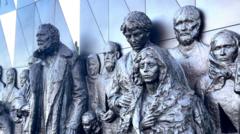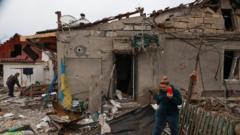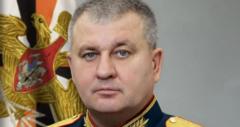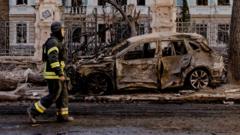As the world marks the 80th anniversary of the liberation of Auschwitz, Russia emphasizes the suffering of Soviet civilians instead of focusing on the Holocaust, prompting concern and criticism from various observers.**
Russia's Shift from Holocaust Remembrance to Soviet Victimhood Amid Auschwitz Anniversary**

Russia's Shift from Holocaust Remembrance to Soviet Victimhood Amid Auschwitz Anniversary**
On the eve of the 80th anniversary of Auschwitz's liberation, Russia recalibrates its narrative to prioritize Soviet civilian suffering.**
On the outskirts of St. Petersburg, a towering memorial honors Soviet civilians who were victims of Nazi genocide. This structure, featuring a mother with her children, stands as a poignant reminder of the immense human suffering experienced during World War II. Below the monument, an eternal flame illuminates the names of infamous extermination camps, including Auschwitz and Treblinka, symbolizing the horrors of the Holocaust. However, the monument is officially dedicated to the Soviet victims rather than serving as a Holocaust memorial.
Russian President Vladimir Putin unveiled this memorial on January 27, a date that holds significance due to the Red Army's liberation of Leningrad from a lengthy siege in 1944 and its entry into Auschwitz one year later. While this day has been established as International Holocaust Remembrance Day, Putin’s address at the memorial focused on the genocide of the Soviet populace, emphasizing a narrative that the Nazis sought to not only conquer but annihilate the Soviet people and their resources.
Efforts to commemorate the Holocaust in Russia have not ceased, with myriad observances around the country. Yet, the prevailing narrative has notably shifted toward emphasizing the collective plight of the Soviet Union, which lost over 27 million citizens during what is referred to as the Great Patriotic War. Critics, including Israel's Ambassador to Moscow, Simone Halperin, underscore the importance of distinctively recognizing the Holocaust as a calculated genocide targeting Jewish people specifically.
Historian Konstantin Pakhaliuk argues that the Russian government’s shift towards victimization helps shape a national identity that frames Russians as perpetual victims of external forces, particularly in light of recent geopolitical tensions following the invasion of Ukraine. This victim narrative conveniently absolves responsibility for aggressive actions undertaken by the state.
While public awareness of the Holocaust in Russia has improved since the fall of the Iron Curtain, the past decade has witnessed growing reluctance to openly acknowledge Jewish suffering in the context of World War II. Twenty years ago, Putin described the Holocaust as a humanitarian tragedy, understanding its implications for all of humanity.
As the 80th anniversary of Auschwitz approaches, Moscow finds itself politically isolated from Western nations, especially Poland, where official invitations to commemorative events have been denied. Historians and Jewish community leaders voice concerns over this exclusion and its implications for Holocaust recognition. Rabbi Alexander Boroda emphasizes the value of collective memory in defeating fascism, while Jewish organizations strive to educate Russians on the historical significance of these events amidst a resurgence in right-wing ideologies and Holocaust denial.
In an era where the past is often politically manipulated, the focus on Russian victimhood sheds light on the complexities of wartime memories, highlighting the continued need for historical accuracy and remembrance.





















